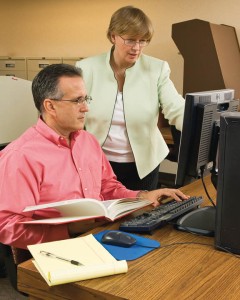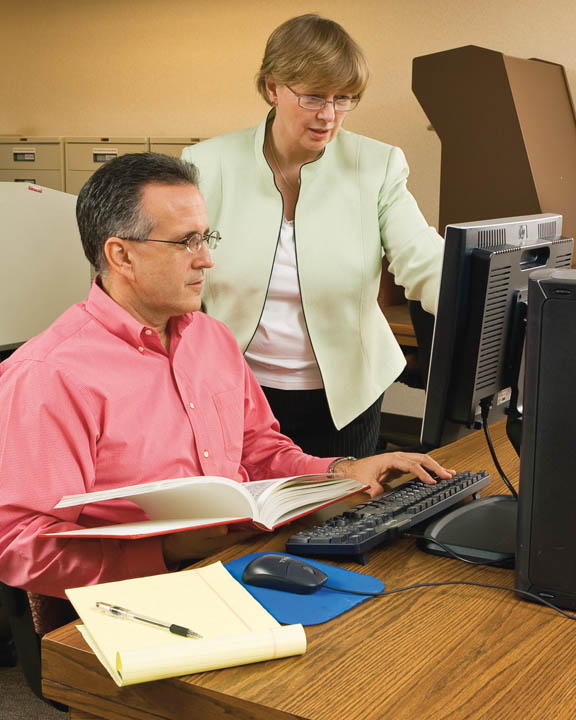A seminar was held on February 23 in Richmond, Virginia, where presenters discussed the preservation and indexing of the Virginia Freedmen’s Bureau Records. The seminar was presented by the Black History Museum and Cultural Center of Virginia and volunteers from the Central Virginia Family History Centers of the Church of Jesus Christ of Latter-day Saints (often referred to as “the Mormons“).
 The Freedmen’s Bureau was a federal agency formed in 1865 to assist and protect newly freed blacks in the South following the American Civil War. The Bureau only lasted nine years, but the records involved in administering it included marriage certificates and licenses, applications for food rations, school and land reports, and other court records. A wealth of information on the ancestors of many of today’s African Americans can be found in these records, so preserving them is important and indexing them is vital to their usability in genealogical research.
The Freedmen’s Bureau was a federal agency formed in 1865 to assist and protect newly freed blacks in the South following the American Civil War. The Bureau only lasted nine years, but the records involved in administering it included marriage certificates and licenses, applications for food rations, school and land reports, and other court records. A wealth of information on the ancestors of many of today’s African Americans can be found in these records, so preserving them is important and indexing them is vital to their usability in genealogical research.
The Freedmen’s Bureau Preservation Act of 2000 authorized U.S. government funding to preserve some 4000 bound volumes of records. Currently preservation is going on under the National Archives & Records Administration (NARA). In a partnership with The Church of Jesus Christ of Latter-day Saints, a searchable CD has been released that contains records of the Freedmen’s Bank. Approximately half a million names are on this CD. Information available on the bank records include names of depositors; names of spouses, children, parents and siblings; birthplaces; and other data useful to genealogical research. It is estimated that 8-10 million African Americans today have ancestors who deposited money in the Freedman’s Bank.
An article that appeared in Powhatan Today on February 20, 2008, described one man’s visit to his local Latter-day Saint family history library. Carleton Finney already had a book with information on his ancestors that had been compiled by relatives, but the volunteer working at the family history library quickly guided him to available census records that verified the information that he had. Family history libraries of the LDS Church are staffed by volunteers who are available to guide researchers of all backgrounds to records that can help them in their search for their ancestors.
Why do people research their family histories? There are many reasons to do so, including that it can be a fascinating hobby. However, members of the LDS Church have additional reasons as well. According to an introductory page at www.familysearch.org, a free online family history resource run by the Church that features access to their extensive record collection:
Why do members of The Church of Jesus Christ of Latter-day Saints do family history research? They do it because they are motivated by love for their deceased family members and desire to serve them.
Life does not end at death. When we die, our eternal spirits go to a spirit world, where we continue to learn while we await the Resurrection and Final Judgment.
Members of the Church believe that the family can also continue beyond the grave, not just until death.
This is possible when parents and their children make special promises, called covenants, in sacred temples. These covenants, when made with the authority of God and faithfully kept, can unite families for eternity.
Members of the Church believe that their deceased ancestors can also receive the blessings of being eternally united with their families.
For this purpose, Church members make covenants in temples in behalf of their ancestors, who may accept these covenants, if they so choose, in the spirit world.
In order to make covenants in behalf of their ancestors, members must first identify them. The Church of Jesus Christ of Latter-day Saints has gathered genealogical records from all over the world. These records are available at the Family History Library in Salt Lake City, Utah, and at Family History Centers throughout the world.
This is a large reason why Latter-day Saints research their family histories. But there are plenty of family history researchers out there who utilize the vast resources of the LDS Church simply out of an interest in their own pasts. The resources of the Church are available to people of all faiths.
So stop by the family history library of your local LDS meetinghouse. Volunteers there will be glad to help you get started on your own journey.


